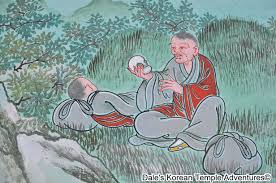 Occasionally, I like to delve into the past, exploring the how and why of our world. Today, I wanted to learn more about the roots of Seo Buddhism. As I read, I discovered a wonderful figure that played a key role in the development of the prevalent form of Buddhism in Korea. His name was Wonhyo. He is often portrayed in pictures, carrying a human skull, and dancing merrily about. In these pictures, he is often accompanied by his good friend Uisang. The story behind the skull is rather macabre, but nevertheless important to Seo Buddhism.
Occasionally, I like to delve into the past, exploring the how and why of our world. Today, I wanted to learn more about the roots of Seo Buddhism. As I read, I discovered a wonderful figure that played a key role in the development of the prevalent form of Buddhism in Korea. His name was Wonhyo. He is often portrayed in pictures, carrying a human skull, and dancing merrily about. In these pictures, he is often accompanied by his good friend Uisang. The story behind the skull is rather macabre, but nevertheless important to Seo Buddhism.
Legend has it that on a dark night a storm drove Wonhyo and Uisang into a cave for shelter near Dangjugye. During the night Wonhyo was overcome with thirst and searched in the dark for something to drink. On the cave floor, he found what he thought to be a gourd filled with cool water and lifting it to his lips drank deeply from its refreshing contents. In the morning when he awoke, he looked for the vessel and was shocked. The delicious, thirst-quenching water of the previous night was dirty rainwater swarming with maggots that had collected in a rotten skull-cap. He fell to his knees and vomited and experienced deep inner enlightenment.
What initially drew me to Wonhyo was a quote I discovered related to this story. Wonhyo says “The three worlds are only mind, and all phenomena arise from the mind, consciousness. If the truth is present in the mind, how could it be found outside of the mind!” Powerful words, that when analyzed, can be a tremendous set of guidelines to live by. To me, these words mean that the world “outside” should not influence how we act or think. Our own consciousness should drive our world and not the other way around.
Wonhyo was referred to as an “unconventional monk” often dancing in the street while spreading the word of Buddha. He did not live a lavish lifestyle like other monks of this time. He lived a secular life among the common people. He educated and inspired people with his talks of enlightenment. He wanted everyone to understand that “there is nothing clean and nothing dirty, all things are created by the mind.”